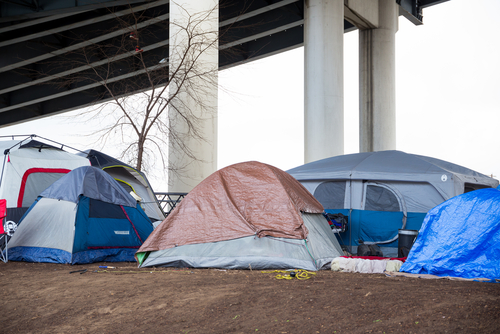Supreme Court upholds ban on sleeping in public, says law does not punish status of homelessness

Homeless camps with tents and tarp shelter under a bridge in downtown Portland, Oregon, in February 2016. (Photo from Shutterstock)
A ban on sleeping or camping on public property in the city of Grants Pass, Oregon, is not cruel and unusual punishment, the U.S. Supreme Court ruled Friday in a case brought by homeless plaintiffs.
Justice Neil Gorsuch wrote the majority decision.
The Eighth Amendment’s ban on cruel and unusual punishment doesn’t apply, Gorsuch said, because it focuses on what kind of punishment can be imposed after a criminal conviction, not on “whether a government may criminalize particular behavior in the first place.”
Gorsuch ruled in a challenge to two ordinances in Grants Pass. One ordinance bans sleeping on public sidewalks, streets or alleyways. A second bans camping on sidewalks, streets, alleys, parks or under bridges or viaducts and defines a campsite as any place where bedding or sleeping bags are used.
The homeless plaintiffs who challenged the law had cited Robinson v. California. The 1962 Supreme Court decision held that criminalizing the status of narcotics addiction, with a possible punishment of 90 days in jail, is cruel and unusual.
The Supreme Court in Robinson bypassed a due process clause argument in reading the Eighth Amendment to impose a limit on what a state may criminalize, Gorsuch said.
“It was a view unprecedented in the history of the court before 1962,” Gorsuch wrote. His opinion, however, did not overrule Robinson.
The ban on camping, Gorsuch said, is “nothing like the law at issue in Robinson.” Instead of criminalizing status, Grants Pass banned actions such as occupying a campsite on public property for temporary living quarters, he said.
“Under the city’s laws,” Gorsuch said, “it makes no difference whether the charged defendant is homeless, a backpacker on vacation passing through town, or a student who abandons his dorm room to camp out in protest on the lawn of a municipal building.”
Other legal doctrines may protect against conviction, however, Gorsuch said. Oregon recognizes a necessity defense to some criminal charges, and it might extend to illegal-camping charges “when it comes to those with nowhere else to go.”
The Constitution “provides many additional limits on state prosecutorial power, promising fair notice of the laws and equal treatment under them, forbidding selective prosecutions, and much more besides,” he wrote.
Justice Sonia Sotomayor dissented in an opinion joined by Justices Elena Kagan and Ketanji Brown Jackson.
“Sleep is a biological necessity, not a crime,” Sotomayor wrote. Jailing and fining people for sleeping outside punishes them for their homeless status, and that is “unconscionable and unconstitutional,” she said.
ABA President Mary Smith said in a statement the decision has “practical implications for the homeless” by allowing cities to issue fines or impose jail times for “life-sustaining activities, such as sleeping in public spaces.”
“With today’s ruling,” Smith said, “it is even more critical for states and local communities to find constructive ways to address the root causes of homelessness and treat those affected with compassion and dignity. The ABA remains committed to finding solutions to homelessness by advocating for the revision of laws and policies to address the challenges that arise when the demand for shelter, housing and services exceeds supply. Instead of criminalizing homelessness, the ABA encourages city, state and local governments to support efforts to increase shelter, housing and services to adequately address the needs of people experiencing homelessness.”
The case is City of Grants Pass, Oregon v. Johnson.
Hat tip to SCOTUSblog, which had early coverage of the decision.
See also:
Supreme Court divided over homeless ban and rights of the unhoused
Supreme Court will consider whether criminalizing homelessness violates Eighth Amendment



